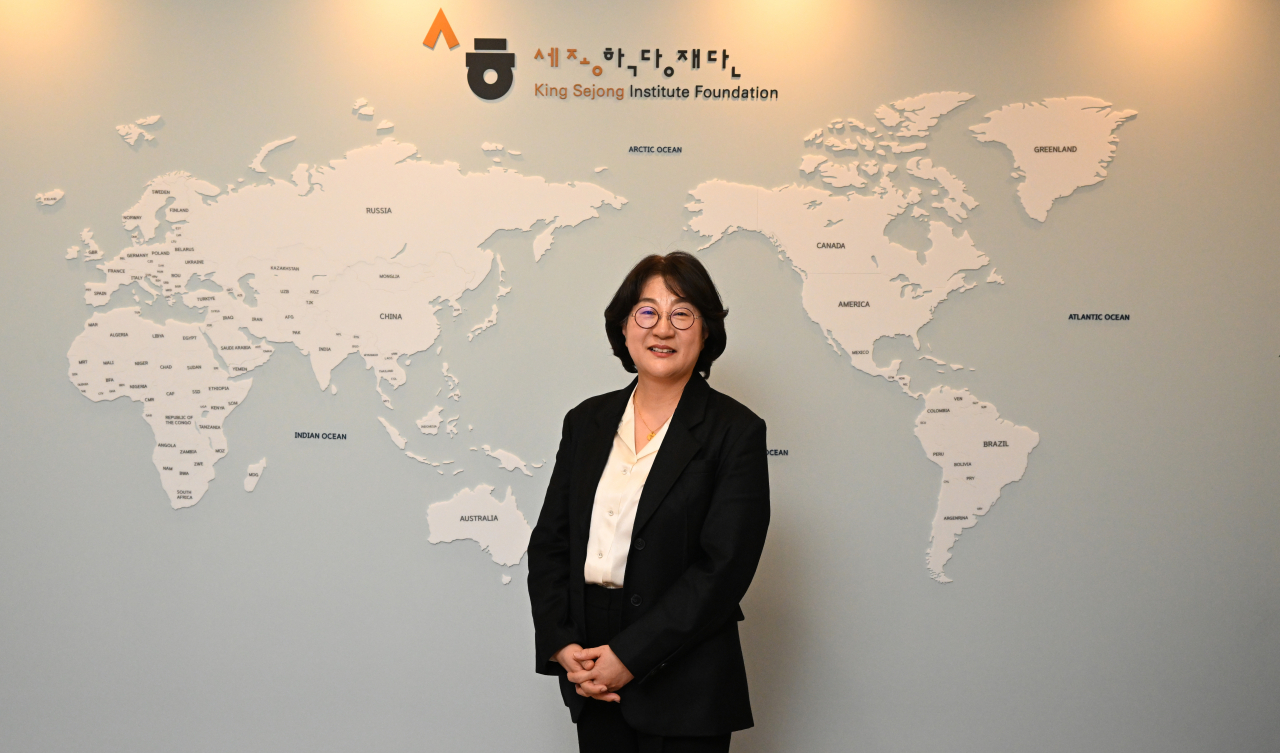The following series is part of The Korea Herald’s “Hello Hangeul” project of interviews, in-depth analyses, videos and various other forms of content that shed light on the stories of people who are learning the Korean language and the correlation between Korea’s soft power and the rise of the language within the league of world languages. – Ed.
 |
Lee Hae-young, chairperson of King Sejong Institute Foundation. Im Se-joon /The Korea Herald |
The ever-growing popularity of Korean content has sparked a boom in Korean language learning worldwide. Standing at the vanguard is the state-run King Sejong Institute Foundation, with 244 language centers across 84 countries under its wing.
In an interview with The Korea Herald, KSIF Chairperson Lee Hai-young said that beyond offering a chance at just another hobby, the Korean language could lay the foundation for a lasting bond between learners and Korea. She also reinforced a commitment to "intercultural communication," as opposed to a one-way strategy to disseminate the local language and culture globally.
“We won’t stop at merely supporting cultural consumers and pursuits of hobbies. We started looking for Sejong alumni who are playing leading roles as cultural producers and experts in academia, governments, cultural and business spheres,” Lee said.
Since the first 13 King Sejong Institutes opened in 2007, some 580,000 people have studied Korean at the state-funded language and culture centers around the world so far. The KSIF was set up in 2012 to designate and support the institutes, which had previously been opened by the Culture Ministry.
There are now 139 centers in Asia, 57 in Europe, 32 in the Americas, 12 in Africa and four in Oceania. As of 2021, over 81,000 students were currently enrolled at the 244 locations.
Among KSI alumni Lee highlighted are a professor in Kenya, an education administrator in Mongolia, a KSI teacher in Vietnam and an Australian winner of an award from the Literature Translation Institute of Korea. Some have even become celebrated singers of traditional Korean musical genres such as pansori -- Laure Mafo of France -- and Gyeonggi Minyo -- Nancy Castro of Mexico.
“A survey of KSI pupils on why they learn Korean showed that about 30 percent were seeking to study in Korea, while about 17 percent were aiming for job opportunities at Korean companies,” Lee said. "Korean is increasingly becoming a foundation for their future vision and careers."
In a poll of 10,284 KSI students in 76 countries conducted between October 2021 and January 2022, about 23 percent chose “interest in Korean culture” and 16 percent picked “curiosity about Korea and Korean language” as their reasons for learning.
The former professor of Korean language education at Ewha Womans University underlined interculturalism, a movement that supports dialogue and interaction between cultures, as her organization’s core perspective.
“Transplanting Korean culture overseas is not our mission. From an interculturalist point of view, we introduce our culture and language to those who are interested, and express our interest in their cultures so we can exchange,” Lee said. "In our annual Korean speaking contests, KSI students talk about their own cultures, which is highly encouraged."
“For those who have learned Korean, Korean is a tool to appeal political situations in their countries or whatever they want to voice their views about. This allows people to understand each other and become friends.”
Lee said she thinks the best thing about soft power is that it is focused on getting to know one another through communication.
The institutes, which have so far largely supported people learning Korean for pleasure as well as Hallyu fans, have begun building long-lasting relationships with an aim to foster pro-Korea leaders, the KSIF chief said.
As there are only a few King Sejong Institutes in Africa and the Middle East, the foundation aims to expand its presence in those regions.
New institutes were designated in Kuwait, Saudi Arabia, South Africa and Tunisia last year.
KSI Riyadh, for example, opened in October within the Prince Sultan University campus in the Saudi capital. The foundation provides Korean teachers and textbooks to the first center in Saudi Arabia, which is run by the university.
Institutes in countries like Egypt and Turkey are in desperate need of more teachers, with thousands of students on their waiting lists due to rapidly rising demand.
Institutes in Iran, Russia and Brazil also each have about 1,000 people wait-listed.
Of 911 KSI teachers worldwide, 639 were hired locally while 272 were sent from the foundation, according to Lee.
The KSIF recruits state-certified teachers who have acquired state licenses or degrees in teaching Korean as a second language through tests and interviews, and trains them rigorously.
Before the KSIF sends teachers abroad, they go through a two-week camp during which they are educated on the cultures of the host country and how to be respectful of different ways of life.
To help current KSI teachers overseas teach better, the KSIF provides various courses ranging from local language and history to contrastive linguistics. The teachers are also trained on how to help pupils’ pronunciation and on detailed classroom techniques.
“All of this is for the sustainable development of Korean language education at KSIs,” Lee said.
Lee is also seeking to expand partnerships with universities and foreign institutions.
The foundation signed an agreement with Uzbekistan’s Agency for Promoting Foreign Language Learning last year to co-run a KSI, retrain Korean teachers in the Central Asian country and use Korean language content developed by the KSIF on an Uzbek educational broadcast channel.
"It is the first time we joined hands with a foreign public organization," Lee said.
The foundation also inked deals with Hanyang University and Ewha Womans University to offer scholarships for KSI graduates applying for degree programs at the schools. It is working with Soonchunhyang University, Silla University, Yeungnam University and Hoseo University to cement future agreements.







